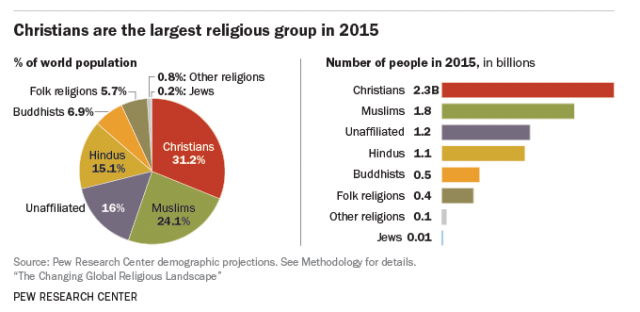Holy Week look at Christianity by-the-numbers
Asian and African growth surges as Europe’s numbers decline.

As Holy Week begins for Christians around the world, some intriguing information on the faith has been released by the Pew Research Center.
Christians remained the largest religious group in the world in 2015, making up nearly a third (31%) of Earth’s 7.3 billion people, according to a new Pew Research Center demographic analysis. But the report also shows that the number of Christians in what many consider the religion’s heartland, the continent of Europe, is in decline.
Christians had the most births and deaths of any religious group in recent years, according to our demographic models. Between 2010 and 2015, an estimated 223 million babies were born to Christian mothers and roughly 107 million Christians died – a natural increase of 116 million.
But among Christians in Europe the reverse is true: Deaths outnumbered births by nearly 6 million during this brief period. In Germany alone, there were an estimated 1.4 million more Christian deaths than births from 2010 to 2015. This natural decrease in Europe’s aging Christian population was unique compared with Christians in other parts of the world and other religious groups. In fact, Muslims and the unaffiliated in Europe both experienced natural increases in their populations, with our new report estimating that there were over 2 million and 1 million more births than deaths, respectively, between 2010 and 2015.

A large reason for the global stability of Christian numbers is the growth of the religion in Asia. In fact, China is on track to be the largest Christian nation on Earth within the next two decades.
“By my calculations China is destined to become the largest Christian country in the world very soon,” said Fenggang Yang, a professor of sociology at Purdue University and author of Religion in China: Survival and Revival under Communist Rule.
“It is going to be less than a generation. Not many people are prepared for this dramatic change.”
China’s Protestant community, which had just one million members in 1949, has already overtaken those of countries more commonly associated with an evangelical boom. In 2010 there were more than 58 million Protestants in China compared to 40 million in Brazil and 36 million in South Africa, according to the Pew Research Centre’s Forum on Religion and Public Life.
Prof Yang, a leading expert on religion in China, believes that number will swell to around 160 million by 2025.
Furthermore, the growth in other areas of Asia has been such that Pope Francis recently appointed the first cardinal to the country of Myanmar. Newly appointed Cardinal Charles Maung Bo offers details on this development.
For six decades, Christians were denied their rights, their properties were confiscated, and their schools nationalized. The missionaries who brought the gospel were exiled. Six decades of darkness.
Evil men thought the Church would collapse. With their simple faith and support from other Catholics, The Church in Myanmar not only survived but thrived.
Hundreds of the young become priests and religious, making ours a vibrant church in South East Asia: From two dioceses, now we are 16 dioceses.
The peoples of Africa also flock to Christianity as well.
…Africa is the zone of Christianity’s greatest growth. It is already the world’s most populous Christian continent, with slightly more Christians today than there are in North America, and the numbers are burgeoning. The Pew Forum projects that by 2050, sub-Saharan Africa will have 1.1 billion Christians, almost twice as much as its nearest rival for adherents, Islam.
Africa is also widely considered the most dynamic corner of the Christian map. A continent that not so long ago was a leading destination for foreign missionaries is now exporting priests and pastors, many of whom perceive a calling to reawaken the faith in parts of the world where they believe it’s become dormant.
Latin America is also seeing an uptick of numbers….from Cuba!
Presbyterian pastor Joel Dopica tells the Associated Press that churches in Cuba are thriving right now.
“All of them are growing, not just in the number of members but in their capacity to lead and act in society,” he said.
…The council estimates that about 25,000 evangelical and other Protestant houses of worship are flourishing across the country. Assemblies of God churches have seen the most spectacular growth in recent years. In the early 1990’s they had roughly 10,000 members compared to 120,000 currently.
Some 100,000 Cubans consider themselves Baptist and 40,000 are Methodist. Sixty percent of Cuba’s 11 million people are baptized Catholic.
May all of Legal Insurrection’s Christian readers have a blessed Holy Week!
 DONATE
DONATE
Donations tax deductible
to the full extent allowed by law.









Comments
The good part of this story is that for perhaps the first time in my life, I am starting to feel hope for the future of Africa and South America.
I have no hope whatsoever for the future of Europe. It’s just said to watch a slow motion suicide, but they seem committed to that outcome, and it’s hard to even imagine anything now that could stop it.
Religious/moral philosophy (i.e. conservative, self-moderating, responsible orientation) precedes civilization precedes liberalism. The circle of philosophy. Europe is on its third… last leg. Americans, if not in percentage, then in absolute numbers, seem better characterized to reconcile moral, natural, and personal imperatives in order to realize fit solutions (e.g. duck dynasty).
Great to see Christianity spreading around the world. So sad to see it disappearing in Europe though. Then again, Christianity is not the massive, empty cathedrals of yesteryear, nor is it the family you are born into. It’s a personal decision, a change of heart and attitude, and the peace of knowing what happens after you die.
The thing with Europe, and to a lesser extent the USA, is that the church used to be a Vestige of Imperialism where people were forced into it more than anything. Like with the fall of Communism, once people are free to express themselves openly, they do so with gusto in the opposite direction. Once that shakes out I suspect what’s left of Europe will become receptive once again.